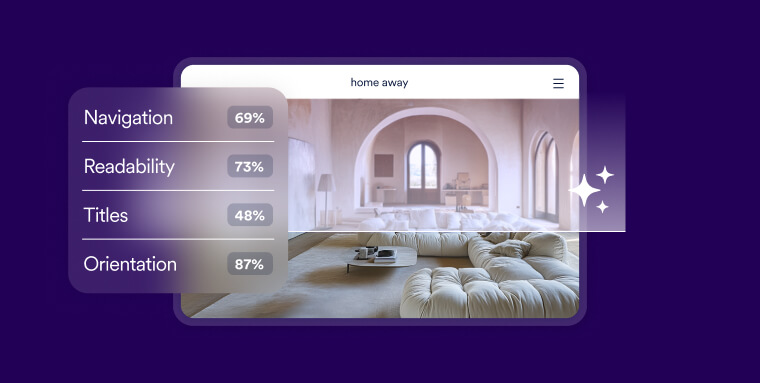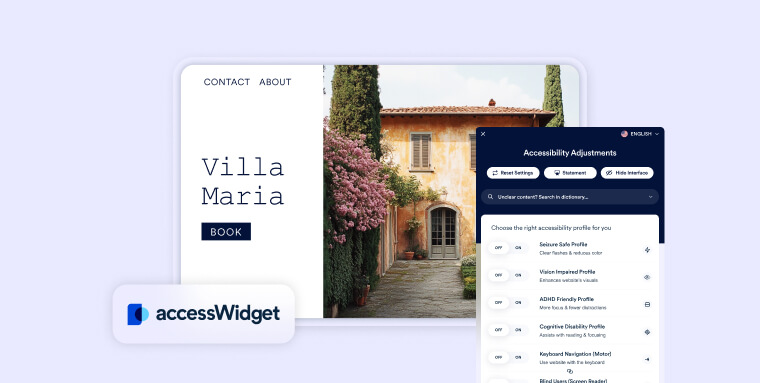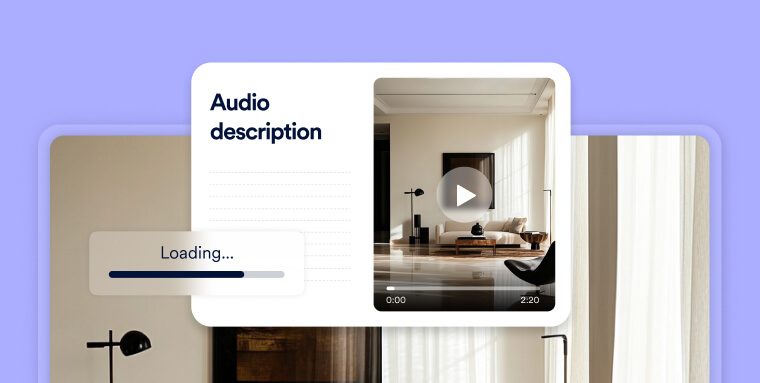Start by auditing your website’s overall accessibility status

The first step in making your short term rental property website accessible is gaining an understanding of your current accessibility status. It’s important to know what barriers exist on your rental property’s website so you can fix them and welcome all users. That way, potential guests with disabilities can more easily navigate your website, understand what you have to offer, and book your property.
When doing so, it’s best to aim to conform with the Web Content Accessibility Guidelines (WCAG). These guidelines, developed by the World Wide Web Consortium (W3C), are a set of best practices and design standards for making content on the internet accessible to users with disabilities.
The WCAG
The WCAG is the globally accepted standard for digital accessibility. It’s organized around four key principles, often summarized by the acronym POUR: Perceivable, Operable, Understandable, and Robust.
- Perceivable: The information must be perceivable for all users
- Operable: User interfaces and navigation should be operable, regardless of user's ability
- Understandable: The content must be understandable and clear to everyone
- Robust: The website should have robust capabilities and the ability to be accessed on various devices
Achieving WCAG Level AA conformance is a critical step in making websites more inclusive, allowing individuals with a wide range of disabilities to access and interact with web content effectively.
Conducting an accessibility audit is the best way to figure out if your website aligns with the WCAG. You can choose to turn to an automated accessibility auditing tool, an accessibility expert evaluation, or a combination of both.
Automated accessibility audits
There are a number of free automated scanning tools, like accessScan, that provide you with a quick yet thorough analysis of your site’s accessibility status. These tools can scan your website in seconds and highlight areas that need attention, letting you know if there are any accessibility issues present.
Automated audits allow you to identify common problems such as missing alt text on images of your property’s rooms and amenities, improperly labeled heading structure, color contrast issues, and more. They are particularly useful for giving you a general idea of your accessibility standing, so you can take the necessary steps to remediate any barrier that may exist. Not only do these barriers present a legal risk, they can also prevent users with disabilities from being able to understand what you have to offer and book your property.
Many of these tools also provide you with an audit report that you can download. Audit reports detail both the areas in which your website is accessible as well as barriers that may stand in the way of accessibility for everyone. This is useful to have on hand as you start your journey toward accessibility.
Manual accessibility audits & user testing
While automated audits are very useful, sometimes a human touch is necessary. Web accessibility experts, such as those from accessServices, can conduct professional audits of your website.
Experts are able to catch things that automated tools may miss, as well as dig deeper into the accessibility issues found and determine their severity and scope. They often use dynamic testing methods, including manual checks and assistive technology simulations, to ensure all potential accessibility barriers are addressed. Expert accessibility audits provide a comprehensive view of your website's accessibility status, allowing you to prioritize and address the most critical issues.
It’s also always a good idea to conduct user testing.
User testing involves having people with disabilities interact with your website to identify real-world barriers. This process helps uncover issues that automated tools might miss, such as problems with navigation, readability, or interaction design. By observing users as they navigate your site, you can gain valuable insights into the true accessibility challenges they may face when trying to book your property. Then, you can make informed improvements.
The optimal approach
The most reliable way to evaluate your website’s accessibility is through a combination of automated tools and human evaluation.
Automated audits can be a good start, and can also provide you with a way to continuously track your accessibility.
Manual audits and user testing offer real-world insights while ensuring that more nuanced and complex accessibility issues can be addressed effectively. This dual approach enables you to address the full range of accessibility barriers so you can create a more inclusive experience for all users, enabling everyone to perceive your rental property, understand the content, and complete their booking.

When you’re ready to make your short term rental property website more inclusive, automated accessibility tools, such as accessWidget, are a great place to start. These are often quick and simple to install and are an affordable way to begin your journey toward a more accessible website.
An automated, AI-powered tool can help remediate many of the accessibility issues on your site, both on the front end and the backend. This allows it to remediate user interface (UI) and design-related elements as well as optimizing your website for assistive technologies such as screen readers and keyboard navigation.
Front end UI adjustments
Many people with disabilities face difficulties interacting with website interfaces when they’re not accessible. Small, hard-to-read text, low contrast ratios, and moving design elements can all cause barriers to use. An automated accessibility tool with an interface component allows site visitors to make accessibility adjustments to the UI, such as scaling the text size, changing the font, pausing motion, and more. You can also select a tool that is session-based, so each user can tailor the adjustments to their unique needs.
Back end remediation
Going beyond the user interface, automated tools like accessWidget also utilize advanced machine learning and AI technology to correct and optimize your website for assistive technologies. This includes automatically scanning and adjusting your website to improve compatibility with screen readers and ensure that users can navigate your site using a keyboard.
Necessary back end accessibility fixes include ensuring that all meaningful images have clear and descriptive alt text, that your website’s content hierarchy is properly labeled, and that menus are navigable with assistive technology.
Implementing automated tools is also a great way to maintain ongoing accessibility as they can provide continuous monitoring and updates. This proactive approach ensures that your website remains conformant as standards evolve and as new content is added, such as additional properties or new information.
Automated tools are not a one-size-fits-all solution, but they are an excellent starting point for addressing technical accessibility challenges quickly and efficiently. They allow short term rental property owners to make immediate improvements that can significantly enhance the experience for users with disabilities. This in turn allows them to view and book your short term rental property, opening your property to a new audience.

Achieving full accessibility involves more than just ensuring your website's pages meet accessibility standards. All digital assets, including documents and media files, need to be accessible to conform with the
Documents and files
All documents available on your website, such as PDFs, should always be checked for accessibility. Ensuring that your digital documents are accessible involves structuring them properly with headings, lists, and tables so that screen readers can interpret them correctly. This also includes providing alternative text descriptions for images within documents and ensuring any hyperlinks are descriptive and clear.
Media remediation
You can make videos and audio files accessible by including captions and transcripts to ensure that users with hearing impairments can perceive the content.
For videos, consider whether the content is meaningful or decorative and ensure that all meaningful content is accessible. For example, if you offer an informative video tour of your rental property, make sure it includes a transcript of the rooms, amenities, and features. Transcripts are vital for people who are blind or have vision impairments, and ensure that they can benefit from your content, too. Implementing these features not only ensures compliance but also improves the overall user experience by making content more engaging and accessible.
Regularly reviewing and updating your digital assets ensures they remain accessible as new technologies and standards emerge. Keeping up with the latest accessibility requirements helps maintain your site’s accessibility and functionality, ensuring all users can enjoy your content fully.
Open your short term rental property to a wider audience
By taking these steps toward making your website accessible, you are not only complying with legal requirements but also opening your short term rental property to a broader audience. Achieving accessibility is an ongoing process that requires regular updates and checks. As technology evolves, so do accessibility standards, making it essential to stay informed and proactive.
Investing in accessibility enhances your reputation, fosters customer loyalty, improves your SEO ranking, and opens up new opportunities for growth and engagement. As more people recognize the importance of accessibility, being a leader in this area can set you apart from the competition and make your rental properties a preferred choice for a wider range of guests.
Accessibility should be viewed as a strategic advantage, helping you to build a more inclusive and successful business. By committing to ongoing improvements and innovations in accessibility, you demonstrate your dedication to serving all customers and setting a new standard in the short term rental market.
If you’re ready to get started on your accessibility journey or to further enhance your site's accessibility, schedule a demo with one of our accessibility experts.
Frequently asked questions about making short-term rental property websites accessible
Q1. Why should short-term rental property owners care about website accessibility?
A1. Because a significant segment of travelers have disabilities, ensuring your site is accessible expands your guest pool and demonstrates inclusivity. At the same time, accessible websites help property owners comply with laws and reduce risk—making accessibility a smart business decision, not just an ethical one.
Q2. What digital accessibility standards should property websites align with?
A2. Property websites should aim to conform to the Web Content Accessibility Guidelines (WCAG). While the exact level may depend on jurisdiction, achieving WCAG 2.0 Level AA or WCAG 2.1 Level AA is widely regarded as the benchmark for inclusive digital experiences.
Q3. What are common accessibility barriers found on rental-property websites?
A3. Common issues include missing alt text on photos of rooms or amenities, low color contrast making text hard to read, navigation that doesn’t support keyboard or screen-reader users, untagged documents or floor-plans, and multimedia without captions or accessible controls.
Q4. What are the first steps property owners should take to improve website accessibility?
A4. They should start with an accessibility audit (automated and/or expert review) to identify current barriers. Then prioritize fixes in high-impact areas (e.g., booking flows, amenity descriptions, images), ensure all media and documents are accessible, and embed accessibility checks into ongoing updates.
Q5. What business benefits come from making property websites accessible?
A5. Accessible listings attract a broader audience, including travelers with disabilities and their companions. This can increase bookings, enhance positive reviews, improve brand reputation, and reduce dependence on last-minute accommodations. Accessibility also helps mitigate liability and positions your property competitively.
Q6. How can digital and physical accessibility complement each other for a rental property?
A6. A well-accessible website sets clear expectations and enables guests with disabilities to assess suitability before booking. Combined with accessible physical amenities (step-free entry, grab bars, clear layouts), it enhances guest satisfaction and lowers risk of negative experiences or claims.
Q7. How can accessiBe help property owners make their websites accessible?
A7. accessiBe offers the best in AI and human expertise. Its solutions provide end-to-end accessibility and compliance support—from AI-powered scanning and remediation of website barriers, to expert audits and monitoring. This helps property owners align with WCAG standards, improve guest experience, and maintain accessible sites over time.





